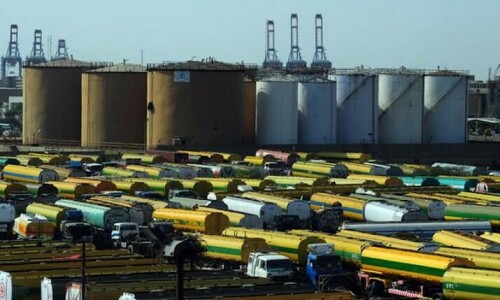TWO of Abu Dhabi’s largest banks have said they are in talks to merge, potentially sparking further rationalisation in the United Arab Emirates as the oil-rich region weathers the oil price slide.
State-owned National Bank of Abu Dhabi and First Gulf Bank, in which members of the ruling family have a significant interest, would surpass Qatar National Bank to become the region’s largest lender.
“Each bank has formed a working group made up of senior executive management to review the commercial potential along with any legal and structural aspects of a merger,” NBAD said last Sunday. “There is no certainty that discussions between NBAD and FGB will result in . . . combination.”
More mergers are expected between Middle Eastern banks if the planned $13bn tie-up ends goes ahead.
Bank of Abu Dhabi and First Gulf move would set up region’s largest lender
A merger to create a regional powerhouse with $172bn of combined assets and $3bn of net profit has been discussed by state shareholders for about a month, according to bankers and lawyers briefed on the situation.
Few details are known but analysts estimate that FGB could pay about $12.9bn for NBAD, a 14pc premium to its market price.
Among the potential deal’s ‘strong merits’, wrote analysts at Arqaam Capital, were “diversification, cost optimisation, increased single-party exposures and substantial funding advantages.”
NBAD, run by Alex Thursby, formerly of Standard Chartered, is the larger with $111bn of total assets. But its profits fell last year to $1.4bn, below those of its faster-growing rival. And first-quarter profits were down 11pc as provisions for bad loans rose by three-quarters.
Government deposits have been withdrawn since the oil price decline sparked a cash crunch among departments and state-related companies. But as the emirate’s main state-owned institution, it has higher asset quality than FGB, bankers say.
Abu Dhabi, 90pc of whose government revenues are from oil, cut spending by a fifth in 2015 and plans a 17pc cut this year. The fiscal consolidation is contributing to a rapid economic deceleration in the UAE capital, from 4.3pc in 2015 to 1.5pc this year, with widespread job losses Investment bankers say the decision to merge is likely to have been made by members of the royal family without much input from managers.
Other Abu Dhabi banks are likely to feel pressure to merge, including Union National Bank and Abu Dhabi Commercial Bank. “It is consolidation 10 years overdue,” said one banker.
Mubadala Development Company, a state investment vehicle, owns 7.1pc of FGB. Sheikh Tahnoun bin Zayed Al Nahyan, a full brother of Mohammed bin Zayed, the crown prince, owns 5.4pc.
The Abu Dhabi Investment Council owns almost 70pc of NBAD.
“We think this is quite real,” said one investment banker. “It could be that it is baked already. But I don’t think they’ve done a lot of work on the details.”
Published in Dawn, Business & Finance weekly, June 27th, 2016
















































Dear visitor, the comments section is undergoing an overhaul and will return soon.